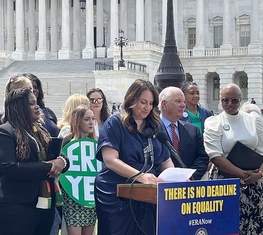Finn v. Cobb County Board of Elections & Registration
Case Summary
The League of Women Voters of Marietta-Cobb, the New Georgia Project Action Fund, GALEO Latino Community Development Fund, the Georgia Coalition for the People’s Agenda, and individual voters filed a lawsuit contesting the newly drawn districts for the Cobb County Board of Education.
The plaintiffs asserted that the districts were a racial gerrymander that packed Latino and Black voters into three of the seven Board districts and divided any remaining Black and Latino voters between the four other districts, thereby ensuring a white majority on the Board.
On June 9, 2022, the League of Women Voters of Marietta-Cobb, along with the GALEO Latino Community Development Fund, Inc., New Georgia Project Action Fund, and Georgia Coalition for the People’s Agenda, Inc. filed a lawsuit asserting that the three new districts for the Board of Education in Cobb County were racial gerrymanders which violated the Equal Protection Clause of the Fourteenth Amendment of the US Constitution.
Cobb County, Georgia is a rapidly growing and diversifying area northwest of Atlanta with a population of almost 800,000. From 2010 to 2020, Cobb County’s demographics experienced significant changes, with the white population decreasing from 60.08% to 51.25% in 2020. At the same time, the Black population increased from 25% to 26.6%, and the Latino population went from 12.3% to 14.5%.
The increased diversity also coincided with far-reaching political shifts. In 2012, Cobb County voted for Republican nominee Mitt Romney by a 12% majority. In 2020, the county voted for Joe Biden by a 14% majority.
These political changes also filtered down to the local level, which included elections for the Board of Education. By 2020, four seats on the seven-member board were held by white members, while the remaining three seats were filled by Black members.
After the 2020 Census results were released, the Board districts were reapportioned in a contentious process that saw the approval of new maps on racial lines, with Black members voting against them and all white members voting in favor. Allegations of a conflict of interest, a lack of transparency by the Board majority, and the absence of a competitive bidding process for redistricting consultants pervaded the process.
The maps were then submitted to the Georgia General Assembly for approval. Under Georgia state law, the legislature is required to approve county Board of Education seats after each decennial Census. Traditionally, county Board of Education maps are effectively approved automatically, so long as the legislative delegation from each county approves them. Yet Cobb County’s legislative delegation raised several objections to the map approved by the county’s Board, including a lack of consultation, concerns about packing voters of color to dilute their voting power, and disruptions of communities of interest.
Despite these concerns, the General Assembly approved the maps proposed by the Board majority.
Three of the new districts (Districts 2, 3, and 6) had non-white Voting Age Populations of 65%, 76%, and 57%, respectively, which the plaintiffs’ Racially Polarized Voting analysis shows are higher percentages than necessary for Black and Latino voters to elect candidates of their choice. This meant that voters of color could not elect a candidate of their choice in District 7, enshrining a 4-3 white majority on the Board, in contrast with the previous version of District 7, which nearly elected a candidate supported by voters of color in the 2020 elections.
The League is represented by the Southern Poverty Law Center, the Southern Coalition for Social Justice, the ACLU Foundation of Georgia, the Lawyers’ Committee for Civil Rights Under Law, and Schulte Roth and Zabel, LLP.
LWV Timeline
League and co-plaintiffs file lawsuit
The League of Women Voters of Marietta-Cobb and its co-plaintiffs file a lawsuit challenging Districts 2, 3 and 6 of the Cobb County Board of Education
Defendants file their motion to dismiss
The Cobb County Board of Education files its motion to dismiss the complaint, alleging the plaintiffs failed to join necessary parties and lacked standing to sue.
Court denies motion to dismiss
The court denies the motion to dismiss filed by the Cobb County Board of Elections and Registration and its director, finding the plaintiffs have standing at the current stage of litigation and that they did not fail to join indispensable parties.
Plaintiffs file motion for preliminary injunction
The plaintiffs move for a preliminary injunction, asking the court to forbid any more elections from being held under the challenged districts. The motion requests the court grant the injunction by December 15, 2023, and set a deadline to adopt remedial districts by January 22, 2024, ahead of upcoming school board elections on May 21, 2024.
Court grants preliminary injunction
The court grants plaintiffs' unopposed motion for a preliminary injunction and prescribes a schedule for drawing new school board districts before the 2024 elections.
School district appeals preliminary injunction
The Cobb County School District appeals the district court's grant of a preliminary injunction to the Eleventh Circuit Court of Appeals.
Eleventh Circuit panels issue conflicting rulings
Two separate three-judge panels of the Eleventh Circuit Court of Appeals issue conflicting decisions in response to the school district's appeal. One panel issues a ruling staying the preliminary injunction entered by the district court. The other panel refuses to hear the school district's appeal, ruling it was no longer a party to the case.
Plaintiffs file emergency motion to dissolve the stay
Plaintiffs file an emergency motion to dissolve the stay, stating that unless the motion is granted, the district court would not have enough time to adopt a remedial map. The motion also pointed out that unless the stay was dissolved, elections officials would be unable to implement a remedial map ahead of school board elections.
Eleventh Circuit denies motion to dissolve stay
A three-judge panel of the Eleventh Circuit denies plaintiffs' emergency motion to dissolve the stay of the preliminary injunction issued by the district court.




